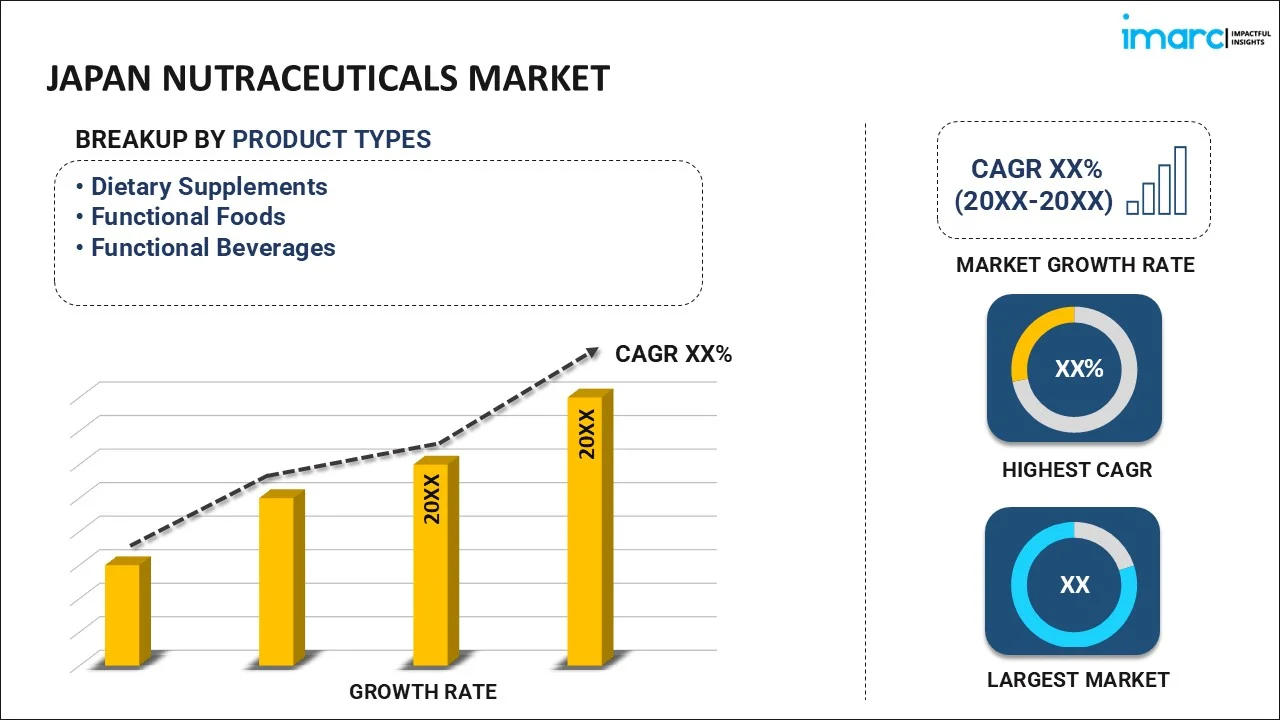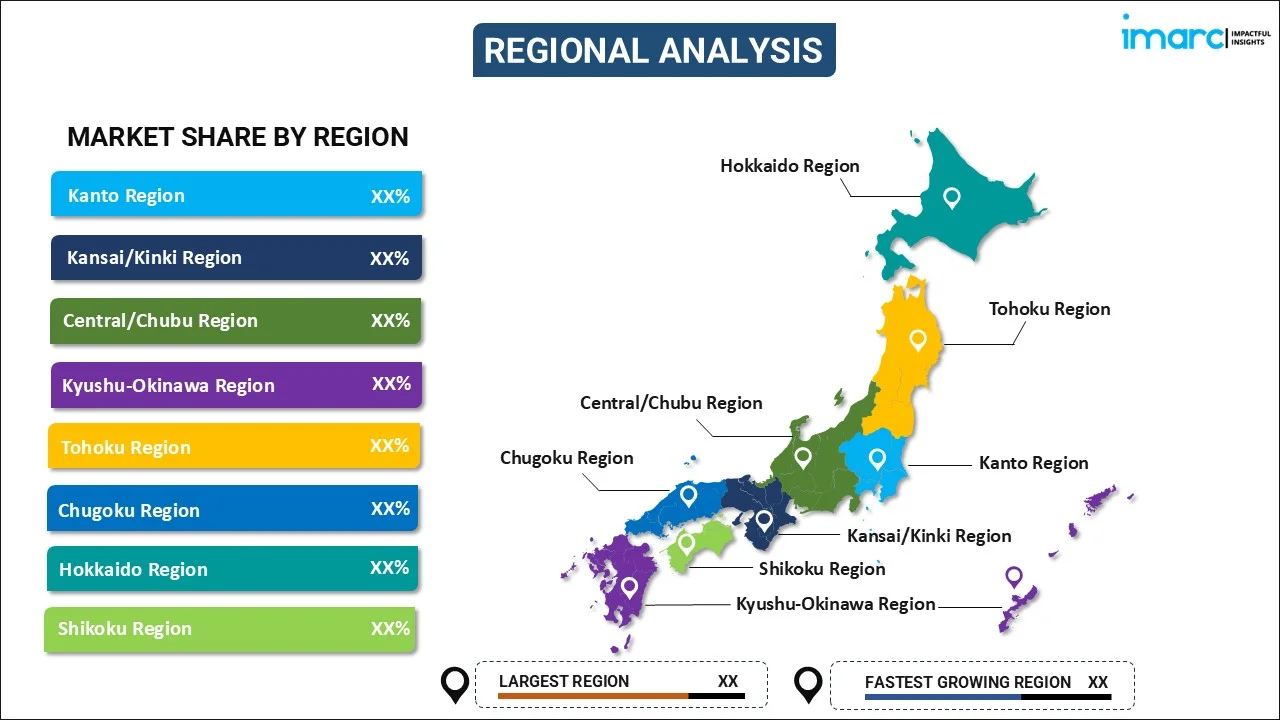
Japan Nutraceuticals Market Report by Product Type (Dietary Supplements, Functional Foods, Functional Beverages), Distribution Channel (Supermarkets and Hypermarkets, Convenience Stores, Drug and Pharmacies, Online Retail Stores, and Others), and Region 2026-2034
Market Overview:
Japan nutraceuticals market size reached USD 23.9 Billion in 2025. Looking forward, IMARC Group expects the market to reach USD 41.7 Billion by 2034, exhibiting a growth rate (CAGR) of 6.35% during 2026-2034. The widespread adoption of functional food by health-conscious individuals, as the contain safer, natural, and healthier ingredients to boost their immunity is primarily driving the market growth.
|
Report Attribute
|
Key Statistics
|
|---|---|
|
Base Year
|
2025
|
|
Forecast Years
|
2026-2034
|
|
Historical Years
|
2020-2025
|
|
Market Size in 2025
|
USD 23.9 Billion |
|
Market Forecast in 2034
|
USD 41.7 Billion |
| Market Growth Rate 2026-2034 | 6.35% |
Nutraceuticals, hailing from food sources and offering health benefits and supplementary nutrition to the human body, come in various forms such as dairy-based concentrates, confectionery, fruit and vegetable juices, energy drinks, and snack bars. They serve as a rich source of an array of nutrients, including vitamins, minerals, antioxidants, zinc, and calcium, all contributing to overall consumer health. Nutraceuticals are widely utilized for purposes such as retarding the aging process, enhancing general well-being, preventing chronic diseases, prolonging life expectancy, and boosting metabolism. Moreover, they play a vital role in addressing a range of chronic medical conditions, including allergies, high cholesterol levels, hypertension, obesity, heart disease, cancer, osteoporosis, and diabetes. Available in various forms such as capsules, powders, liquid tablets, soft gels, and gummies, nutraceuticals are favored for their enhanced safety, effectiveness, purity, and their capacity to promote health and alleviate diseases. Compared to conventional pharmaceuticals, nutraceutical products offer a natural approach with improved physiological benefits and minimal or no side effects.
Japan Nutraceuticals Market Trends:
The Japan nutraceuticals market is experiencing significant growth, primarily propelled by increasing consumer awareness of the health advantages associated with nutraceutical products. These products cater to consumers of all age groups, providing essential vitamins, minerals, fiber, and proteins. Furthermore, the market benefits from growing demand for various functional food items like fats and oils, snacks, cereals, dairy products, baby food, and meat, as consumers seek convenient and ready-to-consume nutraceutical options amid busy lifestyles. Factors such as Western influence, a burgeoning middle-class population, rapid urbanization, and rising disposable incomes contribute to this trend. The food and beverage industry also plays a pivotal role in the market's expansion, with nutraceuticals serving as on-the-go snacks with added nutrients for instant energy and nutrition. The increasing aging population, susceptible to chronic diseases like arthritis, diabetes, cholesterol issues, obesity, cardiovascular diseases, and cancer, further drives market growth. Nutraceuticals, rich in fibers and minerals, promote healthy bowel movements and internal organ cleansing. Additionally, heightened health consciousness and a shift toward dietary supplements, immunity-boosting products, and natural preventive healthcare solutions bolster the market. The preference for naturally sourced, safer, and healthier ingredients over chemically derived alternatives is positively impacting market growth. Innovations like liquid capsules, which expedite manufacturing processes and enhance potency by allowing multiple blends within a single capsule, are expected to fuel market expansion in the foreseeable future.
Japan Nutraceuticals Market Segmentation:
IMARC Group provides an analysis of the key trends in each segment of the market, along with forecasts at the country level for 2026-2034. Our report has categorized the market based on product type and distribution channel.
Product Type Insights:

- Dietary Supplements
- Vitamin
- Minerals
- Herbal Supplements
- Probiotic
- Amino Acid/Protein
- Others
- Functional Foods
- Bakery and Cereals
- Dairy Products
- Meat
- Fish and Eggs
- Soy Products
- Fats and Oils
- Others
- Functional Beverages
- Energy Drinks
- Sports Drinks
- Dairy and Dairy Alternative Drinks
- Fortified Juices
- Others
The report has provided a detailed breakup and analysis of the market based on the product type. This includes dietary supplements (vitamin, minerals, herbal supplements, probiotic, amino acid/protein, and others), functional foods (bakery and cereals, dairy products, meat, fish and eggs, soy products, fats and oils, and others), and functional beverages (energy drinks, sports drinks, dairy and dairy alternative drinks, fortified juices, and others).
Distribution Channel Insights:
- Supermarkets and Hypermarkets
- Convenience Stores
- Drug and Pharmacies
- Online Retail Stores
- Others
A detailed breakup and analysis of the market based on the distribution channel have also been provided in the report. This includes supermarkets and hypermarkets, convenience stores, drug and pharmacies, online retail stores, and others.
Regional Insights:

- Kanto Region
- Kansai/Kinki Region
- Central/ Chubu Region
- Kyushu-Okinawa Region
- Tohoku Region
- Chugoku Region
- Hokkaido Region
- Shikoku Region
The report has also provided a comprehensive analysis of all the major regional markets, which include Kanto Region, Kansai/Kinki Region, Central/ Chubu Region, Kyushu-Okinawa Region, Tohoku Region, Chugoku Region, Hokkaido Region, and Shikoku Region.
Competitive Landscape:
The market research report has also provided a comprehensive analysis of the competitive landscape in the market. Competitive analysis such as market structure, key player positioning, top winning strategies, competitive dashboard, and company evaluation quadrant has been covered in the report. Also, detailed profiles of all major companies have been provided.
Japan Nutraceuticals Market Report Coverage:
| Report Features | Details |
|---|---|
| Base Year of the Analysis | 2025 |
| Historical Period | 2020-2025 |
| Forecast Period | 2026-2034 |
| Units | Billion USD |
| Scope of the Report | Exploration of Historical Trends and Market Outlook, Industry Catalysts and Challenges, Segment-Wise Historical and Future Market Assessment:
|
| Product Types Covered |
|
| Distribution Channels Covered | Supermarkets and Hypermarkets, Convenience Stores, Drug and Pharmacies, Online Retail Stores, Others |
| Regions Covered | Kanto Region, Kansai/Kinki Region, Central/ Chubu Region, Kyushu-Okinawa Region, Tohoku Region, Chugoku Region, Hokkaido Region, Shikoku Region |
| Customization Scope | 10% Free Customization |
| Post-Sale Analyst Support | 10-12 Weeks |
| Delivery Format | PDF and Excel through Email (We can also provide the editable version of the report in PPT/Word format on special request) |
Key Questions Answered in This Report:
- How has the Japan nutraceuticals market performed so far and how will it perform in the coming years?
- What has been the impact of COVID-19 on the Japan nutraceuticals market?
- What is the breakup of the Japan nutraceuticals market on the basis of product type?
- What is the breakup of the Japan nutraceuticals market on the basis of distribution channel?
- What are the various stages in the value chain of the Japan nutraceuticals market?
- What are the key driving factors and challenges in the Japan nutraceuticals?
- What is the structure of the Japan nutraceuticals market and who are the key players?
- What is the degree of competition in the Japan nutraceuticals market?
Key Benefits for Stakeholders:
- IMARC’s industry report offers a comprehensive quantitative analysis of various market segments, historical and current market trends, market forecasts, and dynamics of the Japan nutraceuticals market from 2020-2034.
- The research report provides the latest information on the market drivers, challenges, and opportunities in the Japan nutraceuticals market.
- Porter's five forces analysis assist stakeholders in assessing the impact of new entrants, competitive rivalry, supplier power, buyer power, and the threat of substitution. It helps stakeholders to analyze the level of competition within the Japan nutraceuticals industry and its attractiveness.
- Competitive landscape allows stakeholders to understand their competitive environment and provides an insight into the current positions of key players in the market.
Need more help?
- Speak to our experienced analysts for insights on the current market scenarios.
- Include additional segments and countries to customize the report as per your requirement.
- Gain an unparalleled competitive advantage in your domain by understanding how to utilize the report and positively impacting your operations and revenue.
- For further assistance, please connect with our analysts.
 Request Customization
Request Customization
 Speak to an Analyst
Speak to an Analyst
 Request Brochure
Request Brochure
 Inquire Before Buying
Inquire Before Buying




.webp)




.webp)












